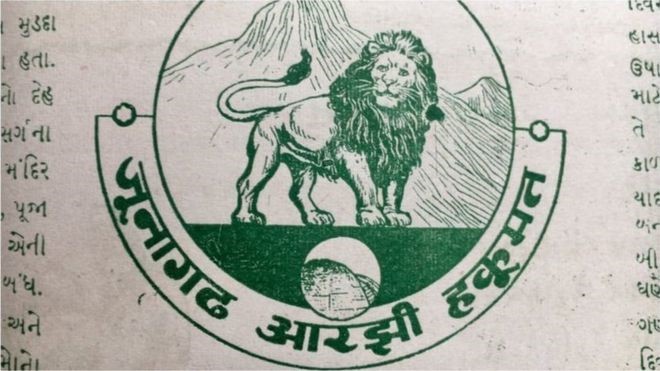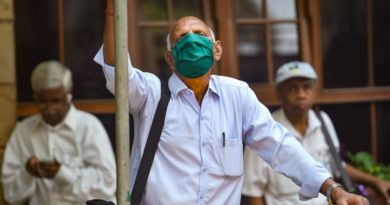Did Pakistan lose Kashmir due to Junagadh’s greed?
Pakistan Prime Minister Imran Khan had released a map counting Junagadh as part of Pakistan, which has been in controversy for a few days.
Junagadh was merged with India not on August 15, but on November 9, 1947. Therefore, the independence day of Junagadh is celebrated on 9 November.
To provide freedom to Junagadh hanging between India and Pakistan, the Arzi government was created.
After the battle of Razi rule, Junagadh became a part of India.
In the recently released new map of Pakistan, Junagadh and Manavadar are shown as part of Pakistan.
India’s Foreign Ministry had reacted to this and said that this is Pakistan’s fruitless effort.
Whenever the state history of India and Pakistan is discussed, then the discussion of Junagadh freedom struggle is also done.
When India became independent and the princely states merged, then Nawab Mahabat Khan was the third ruler in Junagadh.
On 15 August 1947, when India was engulfed in the celebration of independence, the subjects of Junagadh were confused because it was decided to merge Junagadh into Pakistan on the same day.
The country became independent, at that time the British rule implemented the Indian Independence Act 1947. Under which the Lapse of Paramountcy option was given. Through which the king could connect his princely state with India or Pakistan or make his own independent nation.
Keeping in mind the Lapse of Paramounty, Nawab Mahabat Khan announced to go with Pakistan.
The main role in reuniting Junagadh with Pakistan was played by Diwan Shahnawaz Bhutto of Junagadh. He suggested to join Junagadh in Pakistan.
Historian and grandson of Gandhiji, Rajmohan Gandhi believes that Mohammad Ali Jinnah was also behind this.
Rajmohan Gandhi wrote in his book: Patel a Life, about the freedom struggle of Junagadh, “Seven lakh people lived in Junagadh at that time. 80% of them were Hindus. When the Nawab of Junagadh was in Europe, there was something in the palace The rift was going on. In May 1947, Shahnawaz Bhutto, the leader of the Muslim League of Sindh, was made the Diwan of Junagadh. There was a deep connection between Bhutto and Jinnah. Tilting his own two-nation theory to accept Hindu majority states Jinnah was ready. According to Jinnah’s advice, Bhutto did not do anything till August 15. The day Pakistan was formed, the same day Junagadh announced to go with her. “
While mixing Junagadh in Pakistan, the opinion of the people there has been taken, there is no mention of this thing anywhere.
Bhutto did not accept the advice of the leaders of Kathiawar
SV Jani, a retired teacher of Saurashtra University’s history department and head of Saurashtra Kutch History Council, writes in his book: Junagadh na Nawabi Rajinho Adh (End of Junagadh’s Nawabi rule):
“On 13 August, Bhutto had assembled some important businessmen of Junagadh, including a leader named Daya Shankar Dave, who said on behalf of the people of Junagadh that Junagadh should be annexed to India. Also the Kathiawar government The council’s Uchrangarai Dhebar also tried to convince Bhutto. But all the tricks failed. Finally, on August 15, 1947, Junagadh announced to join Pakistan. “
Pakistan did not respond for almost a month. One on 13 September
By sending the telegram it was told that Pakistan has accepted Junagadh.
On September 19, Sardar Patel sent VP Menon, Secretary, Rajwada Account of the Government of India to Junagadh.
He was not allowed to meet the Nawab, but Bhutto gave him all the answers on behalf of the Nawab.
Rajmohan Gandhi has written that Bhutto gave round answers. Things were getting more complicated day by day. The Kathiawad leaders and some Kathiawadi people settled in Mumbai were upset about this.
Why did Sardar Patel not go straight into Junagadh’s war
VP Menon reached Delhi via Junagadh to Rajkot, and from there to Mumbai. In Mumbai, Menon met with representatives of the princely states of Kathiawar’s native states.
In his book: Junagadh na Nawabi Governments, at the end SV Jani writes that “Uchharangarai Dhebar said that the situation is not right. We will not be able to keep people under control for a very long time. Vande Newspaper was a pioneer in the struggle of Junagadh from the very beginning. The editor of Shamaldas Gandhi had said that the people had agreed to form the government themselves with the law in their hands. VP Menon told all these things to Sardar Patel. Sardar Patel was not happy about the people of Junagadh forming their own government. Such a situation could have created more problems in the coming times. “
“At that time some of the important activists of Mumbai believed that this issue could not be resolved with the Satyagraha. Dhebar Bhai was known for his role in the Kathiawadi National War from the Satyagraha of Rajkot in 1938. Sardar Patel and Gandhiji too He was influenced by them. Dhebar Bhai was a staunch Gandhian. He never agreed to take up arms. Sardar Patel told him to do something like Satyagraha and it will be seen later. “
In the case of Junagadh, the Government of India could not do anything directly, because there was a provision of lapse of paramountcy. And according to this provision, Rajwadas with whom they could join or make their own way.
Sardar, Home Minister of the Government of India in such a situation Had Patel made a direct intervention, there could have been a legal hurdle.
After this the Razi regime was created. And this Lok Sena’s Sarsanapati Ratubhai Adani had said that Sardar Patel believes that the people of Junagadh should fight this war. That is, if the people of Junagadh and their representatives raise their voice, then only Junagadh will be able to live in India. And all the delegates understood this.
Building the Razi regime
VP Menon had a meeting with Kathiawadi representatives in Mumbai. In this meeting, all the delegates agreed that there should be a struggle by the people.
And due to this struggle, the idea of Azi rule was established as a parallel government in Junagadh.
Initially Uchharangarai Dhebar was a bit confused, though later he accepted the idea.
After three meetings with the Nawab of Junagadh, Dhebar Bhai took a decision to form Razi Hukum in a meeting. A committee of ten members was formed for this.
SV Jani’s book states that “On 23 September 1947, the decision to form the Razi regime had been decided. But it was to be announced. On 24th September 1947, in his evening prayer, Gandhiji said that ‘The Veraval in Kathiawar It is also a port of Junagadh. Junagadh has moved to Pakistan, but I do not understand how Pakistan can be built in Junagadh. All the princely states are Hindus, and a large part of its population is Hindus. Even if Junagadh became a part of Pakistan, it is a surprising thing. But such incidents are happening everywhere in India. Pakistan should leave from Junagadh. Gandhiji’s words were like a blessing to the leaders who created the Arza Government. “
Shamaldas Gandhi became the head of the Arzi government. On 25 September 1947, the Razi Hukumat was formally established and a collegium was also formed, comprising Pushpa Ben Mehta, Rare Ji Khetani, Bhawani Shankar Ojha, Manilal Doshi, Surgabhai Varu and Narendra Nathwani.
A Manifesto of Razi Hukumat was also made, which was named – the Declaration of Independence of the People of Junagadh, written by Kanhaya Lal Munshi.
On 25 September 1947, Kathiawadis settled in Mumbai called a meeting at Madhavbagh, where the manifesto was unveiled at 6.17 pm.
SV Jani’s book states that “In this manifesto it was said that the Nawab of Junagadh made the mistake of joining Junagadh with Pakistan, ignoring the desire of Hindu majority subjects to join India. Difficult conditions created, which led the people to accept the decision. By doing so, the Nawab lost the loyalty of the subjects. Pakistan too had broken the principle of self-decision and because of this Junagadh was found in Pakistan unqualified and unlawful. Too.”
Talk of meeting in India was also written in this manifesto. It was also written that the power and rights that the Nawab of Junagadh had given to the Razi government.
The people of Junagadh were appealed to follow this rule. Through the manifesto, the people of Junagadh announced the establishment of the Azi Hukumat.
The principle of supremacy of the subjects given in the constitution of independent India was included in it.
Headquarters of RZ government was made in Rajkot. Everything was peaceful for four weeks. Vallabhbhai Patel gave time to Pakistan to take this step back.
Razi Hukumat had taken control of villages like Amrapur, Nawagarh and Gadhakra. As soon as the volunteers of the Razi Hukumat entered the border of Junagadh, then Nawab Mahabat Khan fled from there to Karachi.
Kathiawad’s Muslims are not interested in Pakistan
Shambhu Prasad Desai was a well-known historian of Saurashtra. He also wrote some books on Junagadh and Somnath by amending it, which has an article – Junagadh Sarvajanagraha. In which he writes that “Junagadh was completely devastated. Virani was spread all the way. Diwan Shahnawaz Bhutto and Police Commissioner Mohammad Hussain Naqvi were using force to calm people’s anger and fight against the RJI rule. Razi Hukumat’s army was advancing and Shahnawaz Bhutto had no special options. “
Rajmohan Gandhi wrote in his book that “On October 27, Bhutto wrote a letter to Jinnah. It said,” We have no money left. The grain is so low that now there is concern. Nawab saheb and his family Have to go away. The Muslims of Kathiawar do not see anything in Pakistan. I cannot say anything more than this. My senior cabinet colleague Captain Harvey Johns must have told you the seriousness of the situation. “
On November 2, Razi Hukumat took Nawagarh under control. Five days later, Bhutto sent Harvey Johns to Shamaldas Gandhi in Rajkot. Where Harvey Johns appealed to Gandhi to take control of Junagadh.
On 8 November, Bhutto changed his request and said that the Indian government should take possession of Junagadh, not the Razi government.
Shamaldas Gandhi did not oppose this request. This request was placed in front of Neelam Bhai Butch.
Neelam Bhai Booch was elected as the commissioner for the princely states of Delhi and Gujarat from Delhi.
On 9 November 1947, he took control of Junagadh and hence Independence Day of Junagadh is celebrated on 9 November.
Pakistan got only 91 votes in Lokmat
India accepted Bhutto’s request. At Mountbatten’s request, Menon and Nehru also prepared a message to send to Pakistan.
It was written that we have accepted the application of Bhutto, but before joining Junagadh legally, we will definitely know the views of the people there.
Sardar had expressed his displeasure over this, that there was no need for this public opinion and the people of Junagadh had no such demand.
It was made public on 20 February 1948. Out of 2,01,457 registered voters, 1,90,870 people cast their votes. In which only 91 votes were received for Pakistan.
Kashmir and Junagadh mean game of wazir and pawn
When the country became independent, there were three princely states, whose issue was a bit complicated. These were three princely states – Junagadh, Kashmir and Hyderabad.
Hyderabad was then the largest princely state of 82 thousand square miles. At that time there were 10 million people. 85% of which were Hindus.
However, his army and administration were dominated by Muslims and the Raja of Hyderabad was also a Muslim.
In Junagadh too 80 percent of the subjects were Hindu and the ruler was Muslim.
But the situation was reversed in Kashmir. The king there was Hindu and three quarters were Kashmiri Muslims.
The border of Kashmir was bordered by China and Afghanistan.
Rajmohan Gandhi wrote in his book – Patel a Life that “Sardar was not particularly interested in taking Kashmir. It was important geographically, but most of the people there were Muslims. Mohammad Ali Jinnah wanted to take Kashmir under the guise of Junagadh When the Nawab introduced Junagadh to Pakistan, anti-Muslim air started in Kathiawad. “
“If Lokmat is taken in Junagadh, then the people there would prefer to join India and if there is a Lokmat in Muslim majority Kashmir, then the people would like to come to Pakistan, Jinnah believed. Because of the union of Junagadh Pakistan one A big question arose that if the Nawab and the Diwan were able to add Junagadh to Pakistan, the Nizam would also be able to connect Hyderabad. Jinnah wanted to raise this chess wager using a pawn like Junagadh, that wazir was Kashmir. Jinnah must be sure Had already said that India would demand itself, not the Nawab of Junagadh, but to let the people decide. “
“After such a demand of Hindustan, if the Maharaja of Kashmir talks of joining India, then he himself can request for Lokmat. If Lokmat is taken in Kashmir, then the option of India-Pakistan on the issue of pro-Islam and anti-Islam The election can be contested. On 30 September, Nehru told Liaquat in the presence of Mountbatten that if the Nawab of Junagadh decided that the public of the people of Junagadh should be taken, then his decision will be accepted by India. Then Vallabh bhai Said that if Lokmat is taken in Kashmir, then it will have to be taken in Hyderabad too. Jinnah was not convinced about this. That is why he rejected Lokmat in Junagadh too. “
Junagadh and Hyderabad
Sardar Patel had no particular eagerness to take Kashmir. But after Junagadh, Patel started taking interest in Kashmir.
Rajmohan Gandhi writes that “If Muslims accept the state of the king and Hindu-majority subjects, then why should the Sardar take interest in the state of the Hindu king and the Muslim-majority subjects, and after that Sardar paid equal attention to Kashmir and Junagadh?” Started. Had taken Junagadh and wanted to save Kashmir. Hyderabad was the king of chess for them. So it was necessary to handle it. Had Junagadh and Hyderabad been allowed to enter India, the wazir might have given Sardar to Pakistan. “
But Jinnah turned down the deal. Junagadh was freed and after four days Sardar Patel came to Junagadh. There he addressed a large gathering at the ground of Bahauddin College.
Rajmohan Gandhi writes that in this speech he congratulated Bhutto and Johns for having a real vision and for restraining the Indian Army. He also mentioned Kashmir and Hyderabad – ‘If Hyderabad does not understand reality, then its condition will be like Junagadh too. Pakistan made Junagadh in front of Kashmir. When we tried to solve this issue in a democratic way, he (Pakistan) said that the same rule should be implemented in Kashmir. Only then will they think of Junagadh. Our answer was that if he confesses this to Hyderabad, then only we will accept Kashmir.




